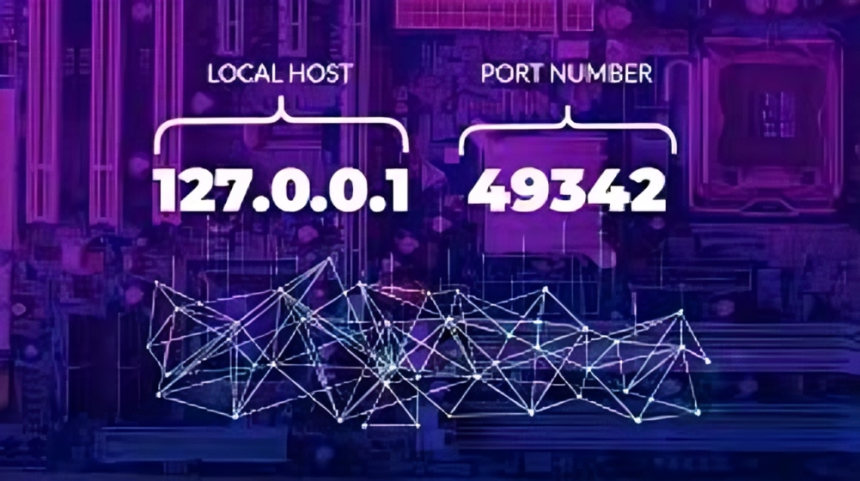Table of Contents
If you’ve ever explored computer networking or troubleshooting, you might have encountered terms like 127.0.0.1:49342. It may seem technical and complex at first, but understanding what this address means and how it works is much simpler than it sounds. This blog will demystify 127.0.0.1:49342 by breaking it down into plain language and giving real-world examples to make sense of this topic.
What is 127.0.0.1?
To start, 127.0.0.1 is known as the “localhost” address in computer networking. It represents the local machine you are currently working on. Think of it as the way a computer talks to itself. Instead of needing to send requests across the internet or even a local network, using 127.0.0.1 allows your computer to communicate internally with its own software or services. This is useful in development, testing, or troubleshooting since you don’t need an external network connection.
In more practical terms:
- 127.0.0.1 is always the local machine (your computer).
- It is used by developers and network administrators to test software locally without exposing it to the outside world.
Breaking Down the Port Number: 49342
Now, let’s talk about 49342. Computers use ports to allow different services and programs to communicate with each other. A port number is like a door on your computer where information enters or exits.
There are 65,535 possible ports on any computer, and each one is reserved for specific types of traffic. For example:
- Port 80 is used for HTTP (web traffic).
- Port 443 is used for HTTPS (secure web traffic).
- Port 21 is used for FTP (file transfer).
When you see 127.0.0.1:49342, the :49342 part refers to a specific port on your computer. It’s a dynamically assigned or ephemeral port—a temporary port used by your system for short-term communication.
What is the Purpose of 127.0.0.1:49342?
When a program runs on your computer and needs to communicate with another piece of software, it might use the localhost address with a random port number like 49342. For example:
- Web servers running locally (like Apache or Nginx) might use a localhost address with an ephemeral port for testing purposes.
- Games or chat programs could open such ports on localhost for debugging network features.
- Database clients may temporarily connect to a database server on the same machine using localhost and a port like 49342.
This setup ensures that communication happens within the same computer. If you are running a program that simulates a web server or database, using 127.0.0.1 with a port such as 49342 allows you to verify everything works correctly before releasing it to a public server.
Why You Might See 127.0.0.1:49342 on Your Computer
If you notice 127.0.0.1:49342 in your browser, command line, or error logs, it’s usually not a cause for alarm. Here are some common reasons it might appear:
- Local Development Server: If you’re a developer, you might have set up a temporary server on your computer. For example, when testing a website or app, your tools might route traffic to 127.0.0.1:49342 for quick testing.
- Game or Application Hosting: Some games or programs run locally on your computer before connecting to the internet. They might temporarily use ports like 49342 to establish local connections during this process.
- Troubleshooting or Diagnostics: Network tools like ping or netstat may show traffic going to 127.0.0.1:49342. This could indicate that a service or program on your computer is temporarily using that port.
- Firewall or Antivirus Alerts: Sometimes, your firewall or antivirus software might log activity involving localhost addresses like 127.0.0.1:49342. This is generally not a threat but simply a notification that a local service was active.
How to Check What’s Running on 127.0.0.1:49342
If you want to know exactly what is using this port, you can use some simple tools available on your computer. Here are a few commands to try:
On Windows:
Open Command Prompt and type:
bashCopy codenetstat -a -n -o | find "49342"
This will display any programs currently using port 49342. You can also see the Process ID (PID), which you can match with the Task Manager to find the program.
On Mac or Linux:
Open Terminal and use:
bashCopy codelsof -i :49342
This command shows which process is using port 49342.
Is 127.0.0.1:49342 a Security Risk?
In most cases, seeing 127.0.0.1:49342 is harmless. Since localhost traffic never leaves your computer, it is considered secure. However, if a malicious program is running on your computer, it could use localhost and specific ports to perform unauthorized activities.
Here’s how you can protect yourself:
- Monitor your ports: Use tools like netstat or Wireshark to keep an eye on open ports.
- Use a firewall: A firewall can block unwanted services from running on your computer.
- Run antivirus scans: Make sure no malicious software is using localhost connections without your knowledge.
Practical Use Cases of 127.0.0.1:49342
Understanding the concept of 127.0.0.1:49342 isn’t just for tech experts. Here are some real-world scenarios where this might come in handy:
- Website Development: Many web developers use localhost addresses to build and test websites before going live. A tool like XAMPP, for instance, allows them to host a website locally using 127.0.0.1 with dynamic ports such as 49342.
- API Testing: Developers working on APIs (Application Programming Interfaces) can use localhost addresses to test their code. Programs like Postman might communicate with a backend running locally through ports like 49342.
- Gaming Servers: Some multiplayer games allow users to host a server on their own machine before making it public. During setup, the game may use localhost addresses to ensure everything works properly before connecting online.
Troubleshooting 127.0.0.1:49342 Issues
If you encounter problems involving 127.0.0.1:49342, such as errors or blocked connections, here are a few troubleshooting steps:
- Check if the Port is in Use: Use the netstat or lsof commands mentioned earlier to see if another program is occupying the port.
- Restart the Application: Sometimes, restarting the program or server that uses this port will fix the issue.
- Check Firewall Settings: Ensure your firewall is not blocking the connection. Since localhost connections stay within your computer, they should generally not be restricted by the firewall.
- Update Software: Outdated software or drivers can cause conflicts. Make sure all your tools and applications are up to date.
Conclusion
In summary, 127.0.0.1:49342 represents a localhost address combined with an ephemeral port, allowing your computer to manage internal communication efficiently. Whether you’re running a local web server, testing an API, or troubleshooting an issue, understanding this concept is crucial.
While it may look complicated, knowing that 127.0.0.1 refers to your own machine and that 49342 is just a temporary port makes it easier to grasp. Most of the time, encountering this address is part of routine computer activity and nothing to worry about. However, if you’re ever curious or concerned about what’s running on this port, using tools like netstat or lsof can help you identify the program behind it.
By familiarizing yourself with networking concepts like 127.0.0.1:49342, you’ll have a better grasp of how your computer communicates internally and be more confident when troubleshooting technical issues in the future.
FAQs about 127.0.0.1:49342
- What does 127.0.0.1 mean?
- 127.0.0.1 is the IP address for “localhost,” which allows your computer to communicate with itself without needing an external network connection.
- What is the significance of the port number 49342?
- The port number 49342 is a dynamically assigned or ephemeral port used by applications to communicate internally on the computer. It is not reserved for any specific service.
- When would I see 127.0.0.1:49342 in use?
- You might see this address in use when running local servers, during software testing, or in application development, where a program temporarily opens a port for communication.
- Is it safe to have applications connecting to 127.0.0.1:49342?
- Generally, yes. Since localhost traffic stays within your computer, it is considered secure. However, it’s always good practice to monitor your ports for any suspicious activity.
- How can I check which application is using port 49342?
- You can check by using commands like
netstat -a -n -o | find "49342"on Windows orlsof -i :49342on Mac or Linux to see which application is occupying that port.
- You can check by using commands like
- What should I do if I find suspicious activity on 127.0.0.1:49342?
- If you find suspicious activity, it’s advisable to run a full antivirus scan, check your firewall settings, and ensure that no unauthorized applications are running on your system.
- Can multiple applications use 127.0.0.1 at the same time?
- Yes, multiple applications can use the localhost address simultaneously, but they must use different port numbers to avoid conflicts.
- Why do developers use localhost for testing?
- Developers use localhost for testing because it allows them to run and debug applications locally without needing internet access, providing a safe environment for development.
- What is the difference between TCP and UDP ports?
- TCP (Transmission Control Protocol) is a connection-oriented protocol that ensures reliable communication, while UDP (User Datagram Protocol) is connectionless and does not guarantee delivery, making it faster but less reliable.
- Can I change the port number from 49342 to something else?
- Yes, you can specify different port numbers in your application settings as long as the new port is not already in use by another application and is within the valid range (1-65535).






